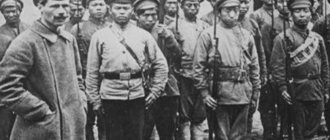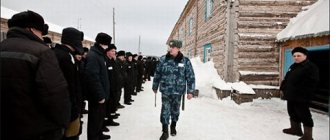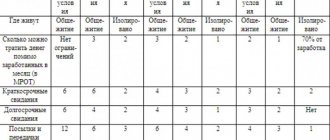The high-profile story of torture in the Yaroslavl colony provoked a wave of similar cases. Reports of jailers using violence against prisoners come from all over Russia - from Kazan and Belgorod to Transbaikalia. Meanwhile, representatives of the Federal Penitentiary Service (FSIN), despite the public outcry, still do not provide any explanations. What secrets do the guards keep? Why did torture become a daily practice for them? And why are there no former jailers? A retired employee of one of the colonies, an operative who devoted more than 10 years to working in the zone, told Lenta.ru about this and much more on condition of anonymity.
“They don’t want to share bunks with prisoners”
When a newbie operator enters the service, he is immediately taught the unspoken rules of the colony and develops a negative attitude towards prisoners. In general, the zone contains both “first-timers” and “repeat offenders,” but first of all, we were given the cases of those who committed terrible atrocities to read. This could be, for example, cannibalism towards one’s own mother or rape and murder of minors. This is done so that employees do not feel compassion and do not disdain, if something happens, to take up the baton. Personally, I didn’t sleep for two nights after reading it.
At the same time, it is prohibited to insult unfamiliar convicts or humiliate them in front of the detachment. One on one - all right. The fact is that the prisoners are closely “tied” to each other, give them freedom - they will give such a rebuff that it will not seem like much. There were cases when an officer called someone names, and then riots broke out.
Photo: Vladimir Gurin / TASS
As for bullying, no one will touch a “gray guy” who lives according to rules, does not “smuggle” (smuggle) drugs and does not start fights. The prosecutor's office now goes to colonies as if they were going to work, so any use of special equipment - handcuffs, gas canisters and rubber batons - must be recorded in reports. Those who are undesirable, who, for example, put out the mash and push their own people, can be locked in an isolation ward. They will not torture you openly. The employees see what’s going on in the zone, and they don’t want to share bunks with prisoners.
The situation is completely different with newly arrived prisoners. The zone is a harsh place; there is no time for long “curtsies.” To understand which of the prisoners was “black” (blatnoy), until 2011, they arranged “acquaintance” in a closed quarantine zone. Before the inspection, all convicts found themselves in a 30-meter-long corridor and immediately received an order from the administration to move through the quarantine at a run.
If he ran, he agreed with all the rules of the colony; if not, he was returned, beaten with rubber truncheons and threatened that the torture would continue until he ran. If he didn’t understand the second time, he was placed in strict conditions of detention.
This is how the administration decided which squad to assign the convict to, so that he would not cause them problems in the future. Sometimes they would ask: “Who are you in life?” In response - a proud “Citizen!” And already five minutes after the distribution, this citizen comes running and screams to be saved.
Where is torture most common?
In pre-trial detention centers there are mostly criminal suspects who have not yet received a sentence in their criminal case, which is still with the investigator, the police or in court. There is a direct interest here—for some, it is to solve a crime, while for others, it is to avoid responsibility.
Therefore, the “professional interest” in people in a pre-trial detention center is always greater than when a person has already been convicted and is in a colony - the verdict has been received, why put further pressure on him?
In addition, pre-trial detention centers are cells, closed spaces, where it is easier to create an ostentatious “peace and quiet” and hide a lot. As the saying goes - something happened in a dark room at night, try to figure it out later. In the colony, everything is in plain sight; if something happens, they will immediately know.
I won’t say that torture is used everywhere in pre-trial detention centers, that it’s the Middle Ages there. Of course, somewhere they go too far, as in recent high-profile stories, but this rather depends on the personal qualities of employees who are too zealous in fulfilling their, as they believe, “responsibilities.” There is no such thing as an order in all pre-trial detention centers to obtain confessions from people at any cost.
More rarely, bullying is the actions of employees aimed at extracting information from a person. More often it is arrogance, a desire to show who is in charge, a sense of power or impunity, as some employees think for the time being.
Most of it is the human factor, the desire to curry favor, the misunderstood interests of the service. The regime in a colony or pre-trial detention center, as a rule, does not affect this.
The real work of extracting information from a person in a pre-trial detention center is carried out very subtly and cunningly, without violence, but this requires a certain skill from an operative or investigator. But not everyone has the patience and not everyone knows how to solve a crime. And therefore, for some, an animal instinct is triggered - to put pressure morally and physically, maybe the person himself admits.
It all depends on the person first of all. Human factor. These public stories with cases of torture in the colonies coming to light are very necessary; they promptly stop many from the desire to “go too far” with the stick.
But in these stories there is always a reverse side: what kind of “person” is the one who was tortured or mocked, beaten, for what reason he - for what reason - ended up in a colony or a pre-trial detention center, and specifically the very moment for which he is now being beaten.
But it is still clear that it is in no way an excuse for an employee that he is really a criminal, dangerous to society, who has ruined someone’s life.
© Alexander Shcherbak/TASS
“If he gets into the zone, I’ll kill you”
When working in the Federal Penitentiary Service, a year goes by a year and a half - and you can retire early, and after 2012, employee salaries were doubled. Therefore, relatives of the leadership began to come to the service through connections. They believed that they were allowed more than others, exceeded their authority and bullied prisoners. Such people from the “golden youth” imagine themselves to be something unknown, but they themselves cannot jump to the horizontal bar during physical training. The prisoners, of course, don’t respect them. For them, authority is only the one who does not give up and knows how to position himself without cheap show-off. They respectfully address such people by rank or first name and patronymic.
And the “majors” did not consider the convicted people to be people at all: they pitted each other against each other, planted prohibited mobile phones in front of their superiors, and insulted them. There was a case when a new employee, out of personal hostility towards a prisoner, cursed at his mother and forbade them to meet, which was supposed to be once a year. Then we barely prevented a riot, but the prisoner said: “If he (the offender) comes into the zone, I will kill him.” I had to fire the “hero”.
In addition to such narrow-minded employees who try to mock prisoners, there are those who enter into illegal intimate relationships with them. Behind bars, after all, apart from the residential and industrial zones, there is a school, a vocational school, a medical unit, so there are also women among the employees. One such employee went to a neighboring colony on dates under the guise of a civilian, another took a prisoner-lover, although she worked in the zone with her husband. After that, he arranged a serious showdown with that convict - they barely separated him. There were also cases of prostitution - albeit hidden.
Photo: Evgeny Kurskov / Kommersant
This is done like this: free friends find a girl who is ready to have sex with a prisoner, pay for the services and help her obtain a certificate from the HOA, which requires three witnesses. They confirm in the document that the girl previously lived with the prisoner and was his common-law wife. Then the prostitute comes on a date with a document and, if management gives the go-ahead, the employees are obliged to let her through. There's nothing you can do about it.
Work in a colony: disadvantages and advantages of compulsory labor in captivity
Working in a correctional institution is the responsibility of the prisoner, which directly follows from Article 103 of the Penal Code, according to which every convicted person is obliged to work in places and jobs determined by the administration. The responsibility of the administration, in turn, is to attract convicts to work “taking into account their gender, age, ability to work, state of health and, if possible, specialty, as well as based on the availability of jobs.”
Refusal to work is clearly regarded by the authorities as a malicious violation, which leads to the placement of the convicted person in a punishment cell and thereby makes it almost impossible for him to be released on parole. However, there are colonies in which employment is a privilege, since there are not enough vacancies for convicts and the administration has the opportunity to choose who to appoint to what positions.
The management of the institution, as a rule, is strongly interested in ensuring that as many prisoners as possible work. First of all, everyone employed in production brings a good profit to the colony, and in addition it is believed that the less free time the special contingent has, the easier it is to control it.
Convicts are also interested in work, since the likelihood of being released on parole is higher if they have labor camp experience. For good, conscientious work, you can regularly receive incentives, which often lead to a softening of the regime and a number of concessions (increasing the number of packages and parcels, increasing the amount that can be spent from a personal account in a store, etc.). In addition, employment is an important element in the reference certificate prepared by the head of the detachment, which is prepared at the parole commission and then submitted to the court. (here is a link to the card about parole). And finally, time in prison for a non-working person passes much more slowly.
Theoretically, wages should have been a good help for the convicted person, especially if the relatives are not rich, but there are dependents left, and even more so if there is material damage from the crime recognized by the court that must be compensated. However, very rarely the salary is enough for anything other than buying food and basic necessities in the store at the colony (more details about the store in the RS card)
There is a fairly common practice when convicted persons are employed in accordance with Art. 106 of the Penal Code i.e. in fact, on a voluntary basis: as a general rule, each prisoner is obliged to work for free on work to improve the colony and the surrounding area for no more than two hours a week, but “upon a written statement from the convicted person” or “by decision of the authorities on the need for urgent work,” the duration can be increased .
Along with this, another common practice is dividing one bet into parts. A convict registered at 0.1 rate, for example, of an orderly detachment, receives 10% of his due salary. Minus deductions for clothing, food, and utility costs, you may end up with 40 rubles a month. Convicts employed in positions involving physical labor in production do not have any relief from the administration of the institution. Well, except that they get the opportunity to use the equipment and the acquired skills of working on it for their personal interests (for example, you can sew a comfortable and outwardly more attractive robe for yourself or others), and can visit the bathhouse complex every day (the rest of the convicts are entitled to a bathhouse once a week).
Prisoners who occupy positions related to organizational work (supply managers, orderlies, senior facilities - clubs, bathhouses, temples, canteens, etc.) feel more at ease. They are in systematic contact with representatives of the colony administration; they are usually known by their first and last names, and by sight. In their regard, a number of concessions are allowed on the part of the employees (elements of civilian clothing are allowed, more informal communication with FSIN employees, free movement throughout the territory of the colony, etc.). Many still do so while in quarantine immediately after arriving at the colony (about admission to the colony - in the MS card). offer to secure appointment to a good position for a monetary reward. You cannot agree right away, as this may turn out to be a scam. The practice of being assigned to a good job for money actually exists in some colonies, but immediately entering into such contractual relationships with unfamiliar prisoners is dangerous: they can deceive you, and then it will be impossible to return the money.
It is reasonable to tell every employee of the prison administration immediately after arriving at the colony that you are ready to work because you are interested in being released on parole. When assigned to a job, agree with what is offered and work, while at the same time establishing contacts among convicts and finding out what opportunities there are for more comfortable and interesting employment and who could help with this.
Share link:
“If you miss a kilogram of tomatoes, everyone will be handed over”
There are cases when management gives criminal orders to employees. When I worked as the head of the operations department, management regularly demanded that during inspections communications equipment, bladed weapons, alcohol and drugs for “thieves” prisoners who influenced the situation in the colony be allowed through.
At the same time, cellular communications were under strict control: according to the law, you can view the correspondence of a convicted person and listen to his telephone conversations. To avoid problems with the criminal gang, we either installed “jammers” that blocked communications, or slipped our SIM cards to the prisoners for wiretapping.
There was also chaos in the production area where the prisoners worked. The bosses received hefty kickbacks by purchasing goods at a premium from suppliers who benefited from this and returned to them part of the amount taken from the state budget. Ordinary employees have their own way of earning money: selling vodka and drugs to prisoners. During 12 years of service, I caught eight “sellers” in my colony. Their markup is crazy. If a bottle costs 100 rubles outside of prison, it costs 1,400 rubles behind bars. The situation is the same with the rest of the “banned” items.
Of course, there are drug suppliers among the prisoners. They are helped to identify them by recruited prisoners-informers, who, in exchange for concessions in the zone, drain the supply channels of “forbidden goods” and hand over prisoners who are preparing riots. Basically, informers work for visits, crossing out marks on work cards about violations, the opportunity to wash themselves one more time, or for perishable food excluded from the prison diet. If you miss a kilogram of tomatoes, they will rat everyone out for it.
Corporation "Zone"
Today the FSIN is a huge “state corporation” with a net profit of over 1 billion rubles a year. The department controls 35 federal state unitary enterprises, which produce more than 100,000 types of products: clothing and footwear, furniture, special vehicles, trailers, building materials, pipes, fittings, and products.
Each federal state unitary enterprise has its own profile. If in the Krasnoyarsk Territory the local federal state unitary enterprise cuts and sells timber, then in St. Petersburg it produces canned fish. All by the hands of the condemned. There are 680,000 people in Russian colonies, prisons and isolation wards. Of these, 450,000 can work, but only 35% of prisoners - 158,000 people - are employed in paid work.
“Never, even during the period of maximum development of production, have we created new types of production on our own,” Alexander Sorokin, head of the department of labor adaptation of convicts of the Federal Penitentiary Service, scolded his subordinates at a working meeting in Chelyabinsk this year. In 2012, FSIN institutions received 65 million rubles in support from regional authorities, but this did not affect either production volumes or the employment of prisoners. “If this is not a clothing production, everything lies dead weight due to lack of orders,” Sorokin said at the same meeting. Clothing and footwear account for almost a quarter of the production structure, which brings the Federal Penitentiary Service 6–8 billion rubles in revenue per year.
The main customer of clothing and shoes is the Federal Penitentiary Service itself, the Ministry of Internal Affairs and the Ministry of Defense.
Every year, the Ministry of Defense places orders for clothing worth approximately 12 billion rubles. “These orders go to intermediaries - private entrepreneurs, who place 30% of them with us [in the zones],” notes Sorokin. “If we had contacted the Ministry of Defense directly, it would have been cheaper for the military.” The Trading House will be responsible for establishing direct contacts.
How much do convicts receive?
The average salary of those sentenced to forced labor in enterprises is higher than that of prisoners. As the head of the press bureau of the Federal Penitentiary Service of the Russian Federation, Kristina Panshina , told Izvestia, in the Novgorod region it is 24 thousand rubles.
According to Panshina, in a number of cases the salary of those sentenced to forced labor exceeds the average salary in the region. Thus, in the Belgorod region the salary reaches 224 thousand rubles, in the Novgorod region - up to 102 thousand rubles, Primorsky Territory - up to 94 thousand rubles, Volgograd region - up to 80 thousand rubles.
However, the vice-president of the division of the International Committee for the Defense of Human Rights in Russia, Ivan Melnikov , believes that the amounts cited by the FSIN can only be in two cases: this is not a salary for a month, but for a year, or these are isolated episodes.
Question answer
Can a convicted person be released on parole for life?








